

" Nearly EVERY course in my program began their posting with "“Identify one important concept, research finding, theory, or idea … that you learned while completing this activity. Then read the posts of your fellow students and comment..." These "Read, Write, Reflect" prompts are good, but they get old fast. Below are some resources that may help improve and add variety to your online discussions. Discussion Best Practice Guide July 2020. Online Ice-breaking Examples. Using Discussion in Traditional, Hybrid, and Online Classes: COSS FCAT. Writing A Substantive Discussion Post for An Online Class Forum. Rubric for Online Discussion Board Participation. Rubric for Asynchronous Discussion Participation Name___________________________________________________________ Asynchronous discussion enhances learning as you share your ideas, perspectives, and experiences with the class.
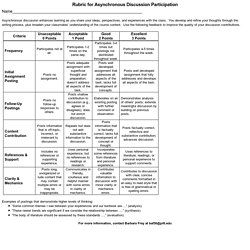
You develop and refine your thoughts through the writing process, plus broaden your classmates’ understanding of the course content. Use the following feedback to improve the quality of your discussion contributions. Examples of postings that demonstrate higher levels of thinking: “Some common themes I see between your experiences and our textbook are….” For more information, contact Barbara Frey at baf30@pitt.edu. OnlineDiscussionRefCard v4 1vdjloi. Dos and Don'ts for Good Discussions. 10 Tips for Effective Online Discussions. These tips can help educators ensure that online discussions are engaging and beneficial for postsecondary students.
For many of today's students and more than a few educators, effective participation in online discussions in postsecondary education may not be second nature. In particular, graduate-level discussions present challenges quite different from their undergraduate counterparts, as master's degree candidates tend to be highly motivated.
This may mean that they frequently exceed the minimum number of required posts and write longer entries. The recommendations below are based on my own experience teaching fully online graduate courses with fifteen to twenty students, although many of these points would benefit those teaching at the undergraduate level as well. 1. It would be easy to hold online discussions to higher standards than discussions happening face-to-face. Be careful what you wish for, however! 2. 3. Derek Bok Center for Teaching and Learning. There are many good ways to respond to students' remarks; none should be used exclusively.
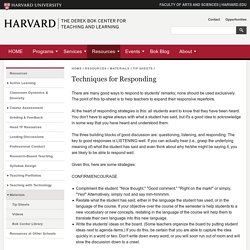
The point of this tip-sheet is to help teachers to expand their responsive repertoire. At the heart of responding strategies is this: all students want to know that they have been heard. You don't have to agree always with what a student has said, but it's a good idea to acknowledge in some way that you have heard and understood them. Communication Expectations. Should You Let Students Lead Discussion Boards? - Faculty Focus. Several years ago, a colleague suggested that having students lead discussions in the online classroom would be a good idea.
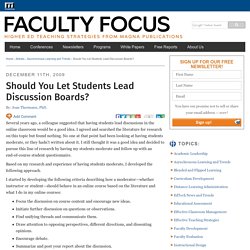
I agreed and searched the literature for research on this topic but found nothing. No one at that point had been looking at having students moderate, or they hadn’t written about it. I still thought it was a good idea and decided to pursue this line of research by having my students moderate and follow up with an end-of-course student questionnaire. Based on my research and experience of having students moderate, I developed the following approach. I started by developing the following criteria describing how a moderator—whether instructor or student—should behave in an online course based on the literature and what I do in my online courses: Focus the discussion on course content and encourage new ideas.
To help prepare students to moderate discussions, I explain why they are being asked to do this. Students work in pairs when they moderate discussions. Online Discussions. Tips for Overcoming Online Discussion Board Challenges. Discussion boards are often viewed as the heart of online courses, and for good reason: the students can interact with one another 24/7, sharing, debating, and offering ideas, insights, suggestions, and information that stimulate the learning process.
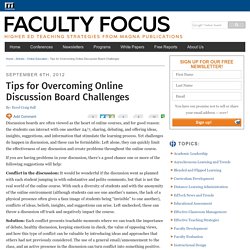
Yet challenges do happen in discussion, and these can be formidable. Left alone, they can quickly limit the effectiveness of any discussion and create problems throughout the online course. If you are having problems in your discussion, there’s a good chance one or more of the following suggestions will help: Conflict in the discussion: It would be wonderful if the discussion went as planned with each student jumping in with substantive and polite comments, but that is not the real world of the online course.
Personal attacks and bullying: These can be an escalation of conflict, the result of students’ beliefs (religious, philosophical, etc.), or a personality trait. Solution: Post examples of substantive posts. Discussionboard. Are You Bored with Discussion Boards? Collaborative Strategies in Blended and Online Courses. Edutopia onlinelearning mastering online discussion board facilitation. DiscussionBoardWorksheet. ABC cs2. Establishing tone. Down and dirty guidelines for effective discussions in online courses.
Tailoring Discussion Boards. Assessment and Rubrics. Learn more about our Online Courses, Online Certificate Programs, and Graduate Degree A collection of rubrics for assessing portfolios, group work/cooperative learning, concept map, research process/ report, PowerPoint, oral presentation, web page, blog, wiki, and other social media projects.
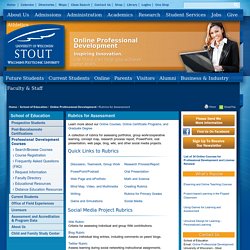
Quick Links to Rubrics Social Media Project Rubrics Wiki RubricCriteria for assessing individual and group Wiki contributions. Blog RubricAssess individual blog entries, including comments on peers' blogs. Twitter RubricAssess learning during social networking instructional assignments. Using Rubrics to Grade Online Discussions - ELC Support. A rubric is a scoring scale used to evaluate a student's work.
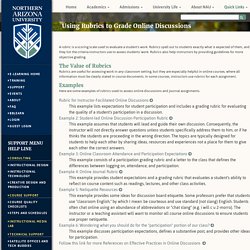
Rubrics spell out to students exactly what is expected of them, and they list the criteria instructors use to assess students' work. Rubrics also help instructors by providing guidelines for more objective grading. The Value of Rubrics. Discussion Rubrics - Pedagogical Repository. Description.
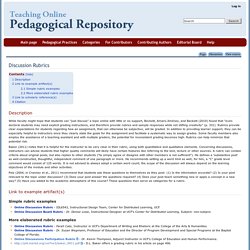
Online Discussion Boards & Rubrics – Center for Online Learning, Research and Service - University of Illinois Springfield - UIS. Discussions Discussion is at the heart of asynchronous online learning.
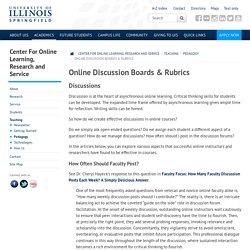
Critical thinking skills for students can be developed. The expanded time frame offered by asynchronous learning gives ample time for reflection. Writing skills can be honed.